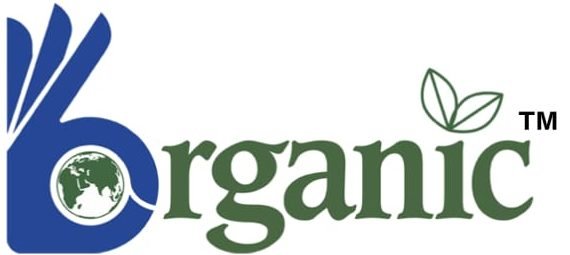*Milkymushrooms : 100g provides 3.8mg Of Zinc*
Zinc (Zn) is an essential trace mineral and is the second most abundant micronutrient in the human body after iron. It is vital for many physiological functions and is involved in numerous aspects of cellular metabolism. Zinc is found in large amounts in the brain, muscles, bones, kidneys, and liver, with the highest concentrations in the prostate and parts of the eye. It is needed for the catalytic activity of around 100 enzymes, as well as for immune function, protein synthesis, wound healing, DNA and RNA synthesis, signal transduction, cell division, hair growth, and skin health. In addition, zinc is essential for normal growth and development during pregnancy, childhood, and adolescence and it’s essential for proper sense of taste and smell. To perform these versatile functions, zinc must be distributed properly throughout the body. The adult human body contains almost 2-4 grams of zinc. To maintain a steady state, the body requires zinc intake daily since it cannot synthesize or store zinc. The best sources of zinc include oysters, red meat, poultry, and sea foods. Beans, nuts, and whole grains can also provide some zinc but they may contain compounds that prevent zinc from being fully absorbed. The daily zinc requriments depends on the age and it varies between 8 milligrams to 13 milligrams for adults. Zinc is absorbed primarily through the small intestine, and excreted primarily through the gastrointestinal tract with some secretion through the urine and sweat.
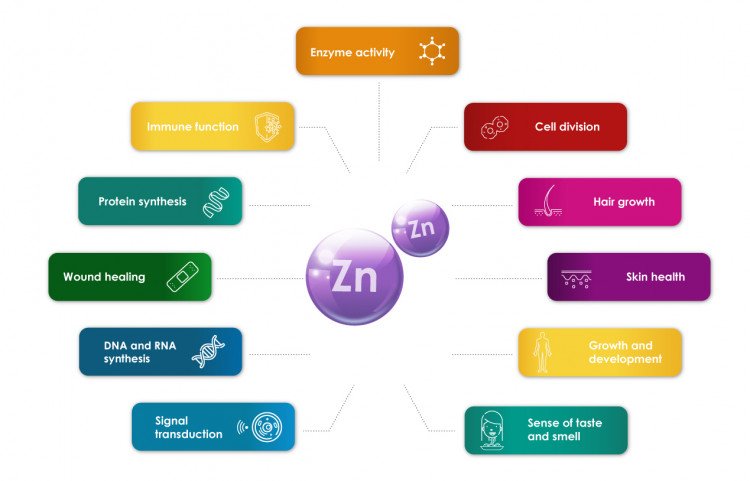
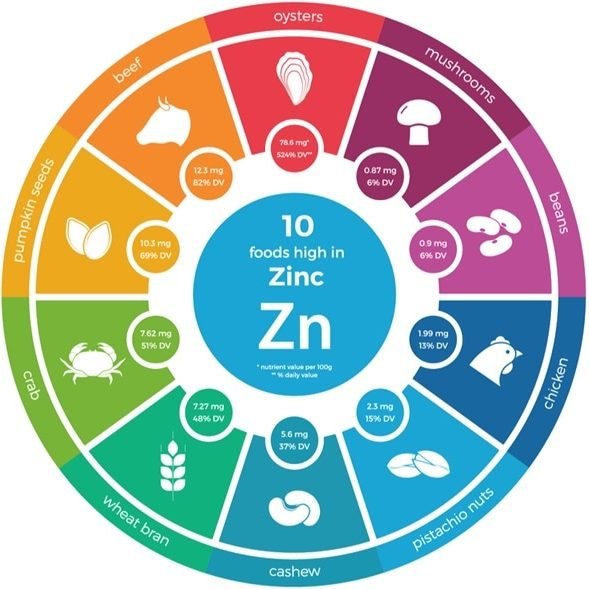
1. Immune function
The body needs zinc for the immune system to work properly. Low levels of zinc can increase the risk of infections, such as pneumonia.
2. Treating diarrhea
The WHO recommend zinc supplements for infants with diarrhea.
There is evidence that it can shorten bouts of diarrhea, especially in those who do not have a nutritious diet.
3. Wound healing
Zinc plays a role in maintaining healthy skin.
People with long-term wounds or ulcers often haveTrusted Source low zinc levels. Healthcare professionals may recommend zinc supplements for people with persistent wounds.
ResearchTrusted Source from 2018 notes that zinc plays a key role in every stage of wound healing, from skin repair to preventing infections. The authors call for more studies to identify precisely how zinc works in healing wounds. This, they say, could lead to new treatments for wounds that are hard to heal.
4. Chronic disease
Zinc has antioxidant properties. As such, it can help reduce oxidative stress. Scientists believe that there is a link between oxidative stress and chronic diseases, such as high blood pressure, diabetes, and other aspects of metabolic syndrome.
ResearchTrusted Source from 2018 suggests that zinc may help prevent metabolic syndrome. They recommend further studies to identify how zinc affects health and to see whether supplementation might be useful as a therapy.
5. Age-related macular degeneration
Zinc prevents cell damage in the retina, and it may help delay the progression of age-related macular degeneration and vision loss, according to the National Institutes of Health (NIH)Trusted Source. However, it is unlikely to prevent the degeneration.
The authors of researchTrusted Source from 2020 have found that a zinc deficiency may play a role in developing this degeneration. They call for further studies and suggest that zinc might contribute to new treatment approaches.
Overall, some studies suggest that supplementation may help, but the evidence is not conclusive.
6. Sexual health
Low zinc levels may lead toTrusted Source delayed sexual development, fertility problems, and other sexual health issues in males.
The authors of researchTrusted Source from 2018 describe zinc as essential to male sexual health. Reasons for this could include zinc’s roles as an antioxidant and hormone balancer.
However, while a zinc deficiency can have a negative impact, too much zinc may lead to toxicity, which could be harmful to sperm.
Anyone considering zinc supplements to support their sexual health should speak with a doctor.
There is some evidence that zinc may help treat some skin diseases, as it plays a role in wound healing.
ResearchTrusted Source suggests that zinc may help treat:
- Acne vulgaris
- hidradenitis suppurativa
- Atopicdermatits
- diaper dermatits
8. Osteoporosis
Zinc plays an essential role in bone formation and health and may help prevent osteoporosis, according to researchTrusted Source from 2020.
However, it remains unclear whether zinc supplementation can prevent or treat this condition, and further research is necessary.
9. Neurological symptoms
A small study from 2020 concluded that there may be a link between low zinc levels and neurological symptoms.
Researchers looked at 63 people who had headaches, tingling, and peripheral neuropathy, as well as deficiencies in zinc and other micronutrients.
After treatment for these deficiencies, the participants reported improvements in their neurological symptoms. However, the researchers acknowledge the need for further research.
10. The common cold
A reviewTrusted Source of studies from 2011 suggests that zinc lozenges may help shorten the duration of the common cold, but only with daily doses of over 75 milligrams (mg).
On the whole, studies looking at the use of zinc for colds have been of poor quality. There is no reliable evidence that taking zinc prevents colds.
Also, the NIHTrusted Source warn that zinc can affect the sense of smell. Speak with a doctor before using nasal sprays or gels that contain zinc, as the damage may be long-term or permanent.
11. Learning and memory
Some research in rodents suggests that zinc may boost cognitive function. In a 2017 studyTrusted Source, rats that received zinc supplements performed better in tasks that involved thinking and memory.
There does not appear to be sufficient evidence that zinc can improve memory or learning in humans, however
For more in-depth resources about vitamins, minerals, and supplements, visit our dedicated hub.
Zinc and COVID-19
Some researchers have suggested that maintaining adequate zinc levels could possibly offer some protection against COVID-19.
One notes that zinc helps boost the immune system and maintain mucous membranes. People with zinc deficiencies appear to have a higher risk of various infections, including pneumonia.
It is important to note, however, that while zinc may boost a person’s overall health and ability to resist disease, there is currently no evidence that it can prevent or treat COVID-19.
Moreover, some zinc products may lead to a permanent loss of smell.
Recommended intake
An adequate zinc intake is especially important for children because it plays a role in their development.
The following table shows the recommended daily allowance of zinc, based on a person’s age and sex:
| Age | Male | Female |
| 0–6 months | 2 mg | 2 mg |
| 7–12 months | 3 mg | 3 mg |
| 1–3 years | 3 mg | 3 mg |
| 4–8 years | 5 mg | 5 mg |
| 9–13 years | 8 mg | 8 mg |
| 14–18 years | 11 mg | 9 mg |
| 19 years and over | 11 mg | 8 mg |
During pregnancy and breastfeeding, a higher intake of zinc is necessary, because newborns and infants up to 6 months obtain zinc through breast milk.
Sources
Good sources of zinc include:
- beans
- meats
- nuts
- fish
- seafood
- whole-grain cereals
- dairy products
- some fortified foods
Anyone with a plant-based diet may need additional zinc, because the zinc available in these foods is harder for the body to absorb.
What are the causes of zinc deficiency?
The leading causes of zinc deficiency in humans include reduced dietary intake, inadequate absorption, chronic illnesses, increased body system usage (like during pregnancy and lactation), or increased zinc loss (burns, hemodialysis, hemolysis, diarrhea, etc.). In addition, people who undergo gastrointestinal surgery like weight loss surgery and people who suffer from digestive disorders have decreased zinc absorption and increased zinc loss in the urine. Vegetarians and vegans are at high risk of zinc deficiency too because they don’t eat meat which is a good source of zinc. Also, alcoholics have less zinc because alcoholic beverages decrease the amount of zinc that the body absorbs and increase the amount lost in the urine.
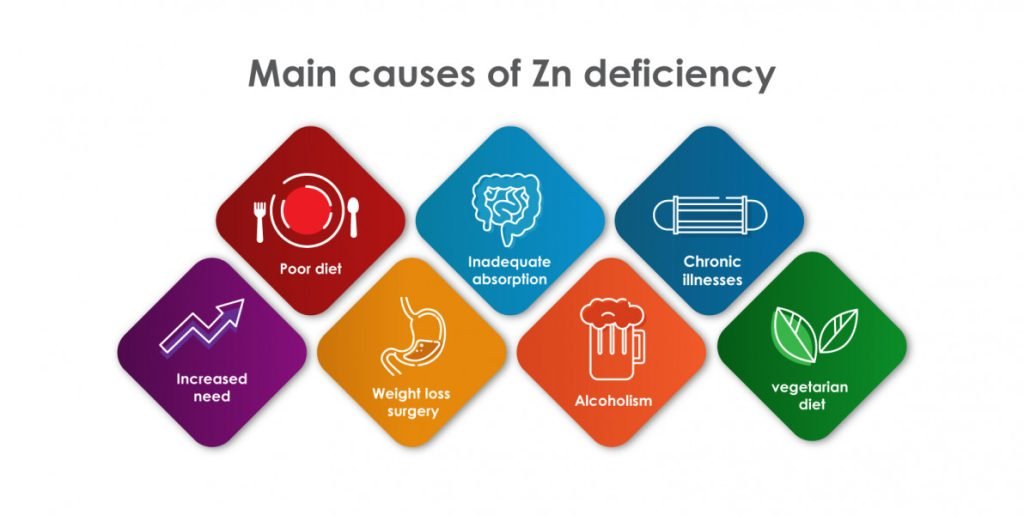
A zinc deficiency can increase the risk of various problems, including:
- delayed growth in children
- a loss of appetite
- changes in taste
- a higher risk of infections
- fertility problems
- diarrhea
- problems with wound healing
- eye and skin lesions
- problems with thinking .
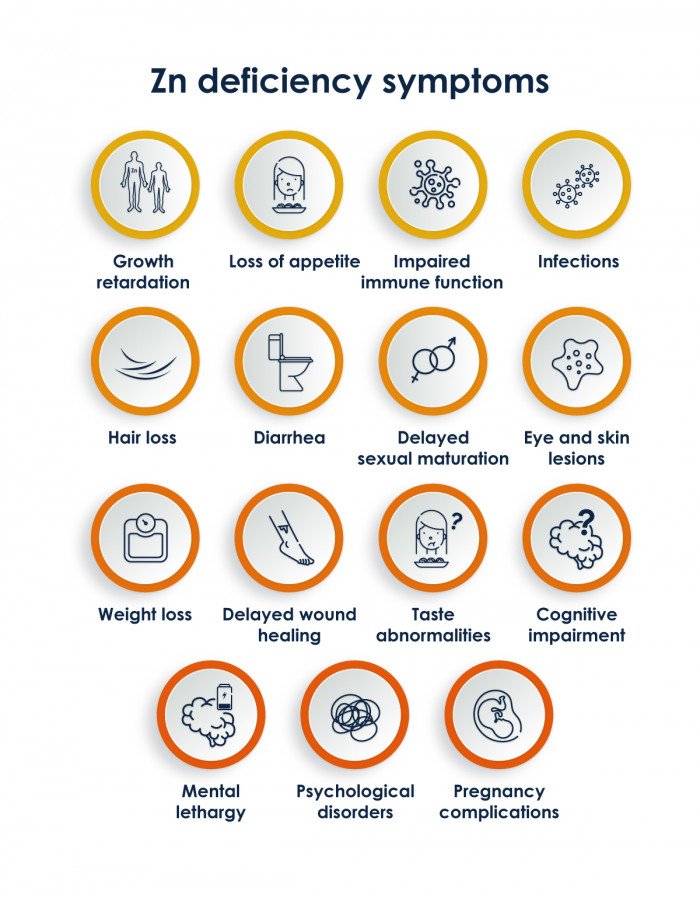
According to researchTrusted Source from 2017, there is strong evidence that low zinc levels can increase the risk of infectious diseases such as malaria, HIV, tuberculosis, measles, and pneumonia.
A zinc deficiency usually results from an insufficient dietary intake, but it can also result from malabsorption and chronic illnesses such as diabetes, cancer, liver disease, and sickle cell disease.
Zinc toxicity
Zinc has many health benefits, but consuming too much can be harmful. Possible adverse effects include:
- nausea and vomiting
- a loss of appetite
- abdominal pain
- headaches
- diarrhea
Over time, the NIH note, an excessive intake of 150–450 mgTrusted Source a day may lead to:
- low copper levels
- changes in iron function
- reduced immune function
- reduced levels of “good,” high-density lipoprotein cholesterol
- urogenital problems
Zinc may also interact with antibiotics and diuretics.
Summary
Zinc is essential for health, and it plays a key role in childhood development, the immune system, wound healing, and other functions.
It is best to obtain zinc from foods, such as beans, seafood, and fortified products. A doctor may prescribe supplements if there is a risk of a deficiency.
People who are pregnant, breastfeeding, or following a plant-based diet require extra zinc. However, as always, check with a doctor before using a supplement.
